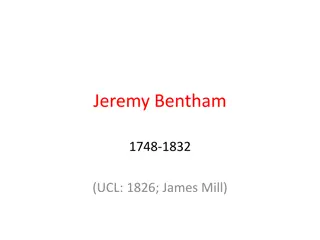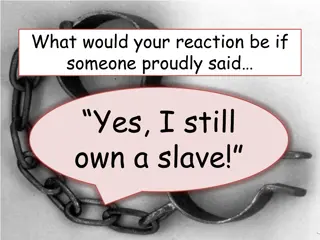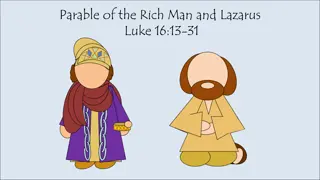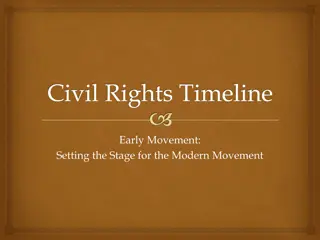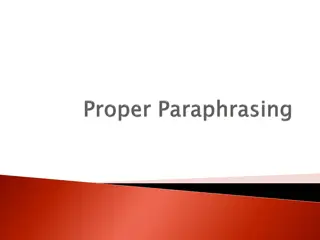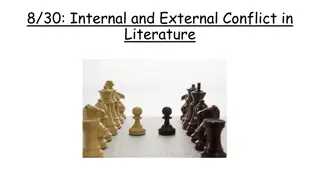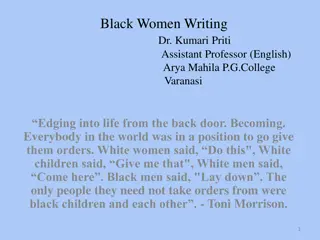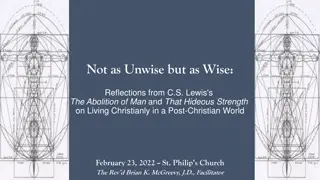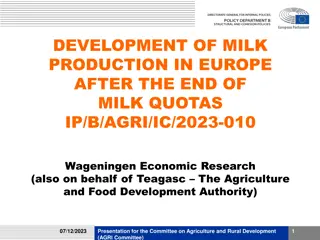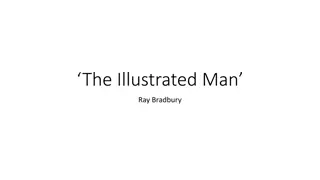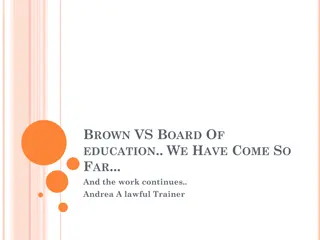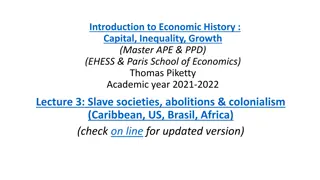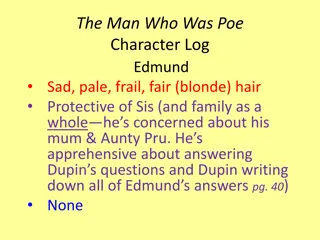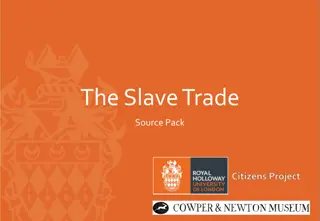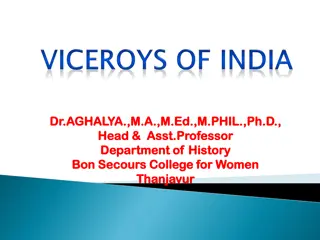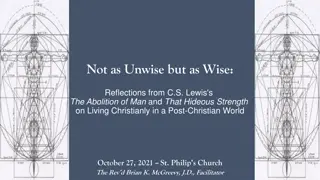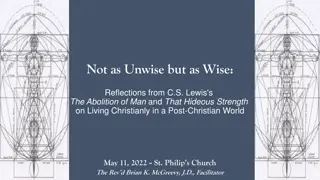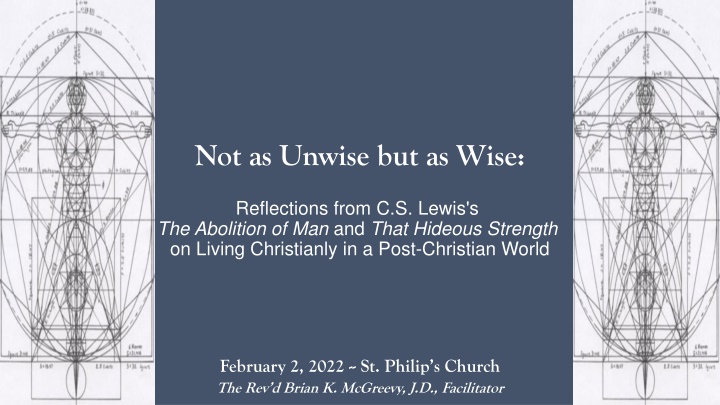
Reflections from C.S. Lewis's The Abolition of Man and That Hideous Strength
Explore insights on living Christianly in a post-Christian world through the works of C.S. Lewis. Delve into themes of light versus darkness, discernment, and wise living. Unpack the Ransom Trilogy and learn how to navigate Lewis's works for relevance today.
Download Presentation

Please find below an Image/Link to download the presentation.
The content on the website is provided AS IS for your information and personal use only. It may not be sold, licensed, or shared on other websites without obtaining consent from the author. If you encounter any issues during the download, it is possible that the publisher has removed the file from their server.
You are allowed to download the files provided on this website for personal or commercial use, subject to the condition that they are used lawfully. All files are the property of their respective owners.
The content on the website is provided AS IS for your information and personal use only. It may not be sold, licensed, or shared on other websites without obtaining consent from the author.
E N D
Presentation Transcript
Not as Unwise but as Wise: Reflections from C.S. Lewis's The Abolition of Man and That Hideous Strength on Living Christianly in a Post-Christian World February 2, 2022 -- St. Philip s Church The Rev d Brian K. McGreevy, J.D., Facilitator
For at one time you were darkness, but now you are light in the Lord. Walk as children of light (for the fruit of light is found in all that is good and right and true), and try to discern what is pleasing to the Lord. Take no part in the unfruitful works of darkness, but instead expose them. For it is shameful even to speak of the things that they do in secret. But when anything is exposed by the light, it becomes visible, for anything that becomes visible is light. Therefore it says, Awake, O sleeper, and arise from the dead, and Christ will shine on you. Look carefully then how you walk, not as unwise but as wise, making the best use of the time, because the days are evil. Therefore do not be foolish, but understand what the will of the Lord is. Ephesians 5: 8-17
How to approach this class: --On the beach --Snorkeling --Scuba diving --Email list How to read That Hideous Strength: --One chapter at a time --Make a chart of characters --Look for and note where themes from The Abolition of Man appear What we ll be doing each week: --Examining context and establishing a framework for appreciating these books --Unpacking the meaning of Lewis s works --Exploring their relevance for today --Considering how we can respond with practices of Hope and of Wisdom rooted in the Scriptures
REVIEW FROM PREVIOUS CLASSES Summary: Main theme of each chapter in The Abolition of Man 1. Men without Chests : The importance of objective values and the poison of subjectivism 2. The Way : Why the Tao, or Natural Law, is the sole source of all value judgments 3. The Abolition of Man : Man s control of Nature is in reality a means for some men (Conditioners) to control other men, using Nature as their instrument. To see through (deconstruct) all things is not to see at all. PLOT SUMMARY OF THE RANSOM TRILOGY Adapted from Taylor Dinerman, The Space Review -- Out of the Silent Planet, tells how Ransom, a Cambridge don on holiday, is kidnapped by the physicist Weston and his partner Devine, a sleazy businessman, and taken to Malacandra (Mars), supposedly as a human sacrifice. Once on Mars he escapes, hides in a Martian village, and learns to speak the local language. He learns that each planet has its own tutelary spirit essentially an angel or archangel called an Oyarsa, who rules under the authority of God. Earth, unfortunately, is the central battleground between Good and Evil and is ruled by a fallen angel, a dark Oyarsa. -- Perelandra, the name Lewis gives to Venus, is also the title of the second book in the series. Retelling the story of Adam and Eve, it is the most explicitly biblical of the three. Weston plays the role of the serpent sent to tempt the woman who is to become the mother of the world into rejecting God s will. Ransom is sent by the Oyarsa to challenge the evil one and to save Venus from the fate of Earth. -- That Hideous Strength combines a sordid tale of intra-university politics, Arthurian legend, and spiritual combat. In a small British University town, one of the colleges finds itself seduced and then engulfed by the newly established National Institute for Coordinated Experiments (N.I.C.E). This organization is secretly controlled by a pair of initiates, who plan to revive the wizard Merlin from his long, enchanted slumber and to use his powers for their own malevolent purposes. To find him they need the services of a seer ; Jane Studdock, the wife of Mark Studdock, a shallow young sociologist entrapped by promises of power, money, and above all membership in the secret, elite clique that controls the N.I.C.E. Ransom leads a small eccentric company of friends who, with the aid of the Oyarsa, take on and defeat them.
The shadow of that hyddeous strength, sax myle and more it is of length (Sir David Lyndsay: from Ane Dialog, describing the Tower of Babel) This is a tall story about devilry, though it has behind it a serious point which I have tried to make in my Abolition of Man. from Preface to That Hideous Strength CHARACTERS IN ORDER OF APPEARANCE --Jane (Tudor) Studdock She had not been to church since her schooldays until she went there six months ago to be married. Jane married Mark six months before the story begins, leaving behind a career she enjoyed. Since then, she works on her doctoral thesis on John Donne, but makes no progress. Before marriage, they had endless talks, but since marriage, she feels alone in solitary confinement. She does not wish for children, as they would impede her career as a scholar. She has nightmares of a man beheaded by having his head twisted off by some other men speaking French. She is disturbed when she sees a picture in a newspaper of precisely what she dreamed. Her dream also includes an ancient bearded Druidical man. Francois Alcasan - An Arabian radiologist who poisoned his wife. He was beheaded for this crime. However, before his execution, Jane sees him in a dream being beheaded by twisting his head off. Jane saw in a man in a dream approach him and speak with him in French (which she did not understand). --Merlin - the ancient Druidical bearded man in a mantle from Arthurian days who also appears in Jane s dream. Merlin has a pagan past but has also been deeply influenced by early British Christianity. -Mark (Gainsby) Studdock - A Fellow in Sociology for 5 years at Bracton College. He talks with Sub-Warden Curry and discovers, to his delight, he is now part of the inner circle, the progressive element. He married his wife Jane six months ago, and they are drifting apart. Mark learns that Lord Feverstone influenced Mark s appointment to Bracton. --
--Sub-Warden Curry - Curry serves as the effective head of Bracton College, who thinks the NICE "marks the beginning of a new era - the really scientific era." Curry wants to cultivate Mark to use him to support his agenda for the college. --James Busby Bursar at Bracton College and another member of the 'Progressive Element . --Canon Jewel A sensible and admired elderly Fellow at Bracton College who is a retired clergyman and a brilliant intellect, but excluded by the 'Progressive Element' for being an 'obstructionist'. --Lord Feverstone - His real name is Dick Divine, who has appeared in the prior stories of the Space Trilogy as a villain. Mark discovers Feverstone as the person responsible for getting his position at Bracton College over another prospect, Denniston. Once Curry and Busby, the Bursar, leave, Mark discovers Feverstone holds them in disdain, but finds them useful in running He joins in cultivating Mark as part of the inner circle of the progressive element in the college. --Arthur Denniston - an old friend of Mark s from university who is also a sociologist and Mark s professional rival. When explaining to Mark why they chose him over Denniston, Sub-Warden Curry says, One sees now that Denniston would never have done. Most emphatically not. A brilliant man at that time, of course, but he seems to have gone quite off the rails since then with all his Distributivism and what not. They tell me he s likely to end up in a monastery. --The Dimbles a professor of English literature at Northumberland College and his wife, with whom Jane Studdock studied and socialized as a college student. The Dimbles live adjacent to Bragdon Wood. --Grace Ironwood The seemingly stern but kind psychologist and doctor who helps Jane interpret her dreams. Inspired by the J rnvi r ("Iron-Wood") of Norse mythology (female giants), her name is softend with the Christian name "Grace". --Ivy Maggs part-time housekeeper for Jane Studdock, who considers her a terrible talker. --John Wither Deputy Director of the N.I.C.E. characterized by vague conversation that is impossible to pin down and a sense of not being fully present; his eyes seem to indicate that he is far away elsewhere. --William Hingest (a.k.a. Bill the Blizzard ) a brilliant scientist from Bracton College who is now employed at the N.I.C.E. but has decided to leave there and warns Mark of the corrupt powers of the N.I.C.E. --Professor Filostrato an eminent Italian physiologist who works for the N.I.C.E. who takes an interest in Mark -- Fairy Hardcastle the aggressive head of the Secret Police of the N.I.C.E.
REVIEW OF CHAPTER 1, SALE OF COLLEGE PROPERTY --Jane and her dreams --Mark and the Inner Circle at Bracton College --The proposal to sell Bragdon Wood and Merlin s Well to the N.I.C.E. --The Dimbles and rumors of Merlin REVIEW OF CHAPTER 2, DINNER WITH THE SUBWARDEN --Mark and being included in Feverstone s confidence in disdain of Curry and Busby --The N.I.C.E. as the ultimate Inner Circle/Ring , focused on taking over and reconditioning the human race, controlling and subduing Nature, and exerting control over the interplanetary wars --Jane s fears and vulnerability, which she later rejects as unworthy --Mark s journey to Belbury and Jane s journey to St. Anne s-on-the-Hill REVIEW OF CHAPTER 3, BELBURY AND ST. ANNE S-ON-THE-HILL --doublespeak at the N.I.C.E.: does Mark have a job or not? --Bill Hingest leaving the N.I.C.E. --Jane s visit to St. Anne s and her denial and her aversion to being interfered with --Mark s introduction to Fairy Hardcastle and the role of the N.I.C.E. secret police --Jane s resentment of how much she has had to give up in marriage; Mother Dimble s crisis
SUMMARY OF CHAPTER 4, THE LIQUIDATION OF ANACHRONISMS Adapted from Rudy Rentzel When Mother Dimble arrives at Jane's, she relates how a construction crew under orders from the N.I.C.E. appeared without notice at their cottage, cut down all the trees around their house, and began to rip up their yard, saying they had to be out of the cottage by 8 o'clock the next morning. Big trucks arrived along with tractor engines and a huge crane. Neither the Dimbles nor Ivy Maggs know what to do now that they have been turned out. Jane assures Mother Dimble she can stay as long as she likes. At night, Jane awakes Mother Dimble with shouting while dreaming. In her dream, Jane is horrified to see a man being killed by three others who beat him to death in a cruel manner. At Belbury, Mark meets a clergyman, Rev. Straik (called the Mad Parson). Straik believes the N.I.C.E. program must be carried out with violence, which shocks Mark. Straik repudiates the after-life, as well as all organized religion. Instead, he interprets the gospel to mean Jesus wants us to bring about the Kingdom of God in the here and now, through the instrument of science as enforced by the N.I.C.E., to whom every knee shall bow. Straik believes himself to be a prophet and says Mark has no choice about being used by the N.I.C.E, for "no one goes out of the N.I.C.E. Those who try to turn back will perish in the wilderness. Mark notices his wallet has gone missing. At a N.I.C.E. committee meeting, Deputy Director Wither announces that William Hingest had been murdered, beaten to death and left lying near his car about 4 a.m. The N.I.C.E. police, led by Miss Hardcastle, were the first on the scene, and the local police and Scotland Yard were allowing them to take the lead in the case, and cooperating wonderfully. A subdued round of applause followed. After expressing regrets about Hingest's resolution to withdraw from the N.I.C.E., Withers delivered an obituary about his life.
Jane enjoys spending the morning with Mrs. Dimble and trues to convince herself that since she "had it all out" with Miss Ironwood, the dreams would stop. Mother Dimble tells her that Ivy Maggs (Jane s char ) has left Edgestow for St. Anne s, because the N.I.C.E. turned her out of her home as well. Later in the day, Jane runs into Sub-Warden Curry from Bracton College, and he tells her that Bill Hingest has been murdered in the middle of the night, with his body found badly beaten about the head. Jane escapes into a coffee shop, shattered and sickened by this news, which confirmed that her dreams had not ended. She believes she actually saw the murder of Hingest in her dream. She feels despair at her powerlessness to stop these visions, and she feels no desire to go back to the company at St. Anne s, believing that they were somehow mixed up in all this. Meanwhile, at the N.I.C.E. in Belbury, Crosser tells Mark they have a job to do, which is to prepare a report on a village, Cure Hardy. The N.I.C.E. is planning to redirect the Wynd River (which presently goes through Edgestow) through the village of Cure Hardy, which will wipe out the quaint village which is famed for its beauty. The N.I.C.E. will build a new model village four miles away. Mark is told that the report must list all the reasons this beauty spot must be got rid of, focusing on poor sanitary practices, undesirable inhabitants, and out of date agriculture. They will write the report first and then go see the village afterwards. When they go to Cure Hardy, Mark is moved by its beauty, something his love for Jane has awakened in him. The beauty of it reminds Mark of being on holiday and recalls the pleasure of earlier visits to charming English villages. Though he tried to look disdainfully at the village as a sociologist, he can t help but like the village. Lunching in a pub, Mark tries to conveys his sense of the beauty of the village, which Crosser dismisses out of hand and says is not their department. Suddenly, Mark is struck by a sense that Crosser is a bore and a sense of feeling sick about the N.I.C.E. He thinks he might chuck it and return to Bracton. Mark returns home to Edgestow to see Jane, but they have a very guarded conversation where Jane feels that Mark isn't telling her everything about the N.I.C.E. and Belbury, though he speaks confidently about them. She worries whether he gave up his fellowship at Bracton, and he reassures he hasn't.
Meanwhile, the Fellows of Bracton College meet that evening over wine and dessert in their beautiful quarters. They can hear the very noisy work of the N.I.C.E. at Bragdon Wood outside the window so that its difficult to carry on a conversation. Lord Feverstone attends and informs Curry (the Sub-Warden) that Mark is not returning to Bracton, but he's not sure when he'll send a formal resignation. Feverstone regards this as good, since it means they can have someone lined up when the formal resignation comes through, and Feverstone already has someone in mind. The noise outside gets louder, the floor starts shaking, they hear shots and wonder if someone is being murdered, and finally, the magnificent ancient window of the hall shatters as a shower of stones falls on the floor. KEY PASSAGES IN CHAPTER 4 Without a doubt, thought Mark, this must be the Mad Parson that Bill the Blizzard was talking of ,He had been walking with the Reverend Straik in the garden Do not imagine, said Mr. Straik, that I indulge in any dreams of carrying out our programme without violence. There will be resistance. They will gnaw their tongues and not repent. We are not to be deterred... It is no part of our witness to preserve that organisation of ordered sin which is called Society. To that organisation the message which we have to deliver is a message of absolute despair. Now that is what I meant, said Mark, when I said that your point of view and mine must in the long run, be incompatible. The preservation, which involves the thorough planning, of Society is just precisely the end I have in view. I do not think there is or can be any other end. The problem is quite different for you because you look forward to something else, something better than human society, in some other world. With every thought and vibration of my heart, with every drop of my blood, said Mr. Straik, I repudiate that damnable doctrine. That is precisely the subterfuge by which the world, the organization and body of Death, has sidetracked and emasculated the teaching of Jesus, and turned into priest-craft and mysticism the plain demand of the Lord for righteousness and judgment here and now. The Kingdom of God is to be realised here in this world. And it will be. At the name of Jesus every knee shall bow. false gospel, violence, overthrow of society, denial of eternal Kingdom
In that name I dissociate myself completely from all the of organized religion that has yet been seen in the world. And at the name of Jesus, Mark, who would have lectured on abortion or perversion to an audience of young women without a qualm, felt himself so embarrassed that he knew his cheeks were slightly reddening This was exactly the kind of conversation he could not endure; and never since the well-remembered misery of Scripture lessons at school had he felt so uncomfortable For, mark my words, this thing is going to happen. The Kingdom is going to arrive: in this world: in this country. The powers of science are an instrument. An irresistible instrument, as all of us in the N.I.C.E. know. And why are they an irresistible instrument? Because science is based on observation? suggested Mark. They are an irresistible instrument, shouted Straik, because they are an instrument in His hand. An instrument of judgment as well as of healing. That is what I couldn t get any of the Churches to see. They are blinded. Blinded by their filthy rags of humanism, their culture and humanitarianism and liberalism I have come to stand alone: the only prophet left. I knew that He was coming in power. And therefore, where we see power, we see the sign of His coming. And that is why I find myself joining with communists and materialists and anyone else who is really ready to expedite the coming. The feeblest of these people here has the tragic sense of life, the ruthlessness, the total commitment, the readiness to sacrifice all merely human values, which I could not find amid all the nauseating cant of the organised religions. Scientism, rejection of Church Sweep away all idea of co-operation! Does clay co-operate with the potter? Did Cyrus co-operate with the Lord? These people will be used. I shall be used too. Instruments. Vehicles. But here comes the point that concerns you, young man. You have no choice whether you will be used or not. There is no turning back once you have set your hand to the plough. No one goes out of the N.I.C.E. Those who try to turn back will perish in the wilderness. But the question is, whether you are content to be one of the instruments which is thrown aside when it has served His turn one which having executed judgment on others, is reserved for judgment itself or will you be among those who enter on the inheritance? For it s all true, you know. It is the Saints who are going to inherit the Earth here in England, perhaps within the next twelve Then, suddenly lowering his voice, Straik added: The real resurrection is even now taking place. The real life everlasting. Here in this world. You will see it. Slavery to cause, seduction of Inner Ring, false gospel
Oh yes, there are dozens of what look like policemen all over the place, and I didnt like the look of them either. Swinging some kind of truncheon things, like what you d see in an American film. Do you know Jane, Cecil and I both thought the same thing: we thought, it s almost as if we d lost the war. ---evil and why vigilance matters Jane found Mother Dimble an embarrassing person to share a room with because she said prayers. It was quite extraordinary, Jane thought, how this put one out. One didn t know where to look, and it was so difficult to talk naturally again for several minutes after Mrs. Dimble had risen from her knees. Are you awake now? said Mrs. Dimble svoice, quietly, in the middle of the night. Yes, said Jane. I m sorry. Did I wake you up? Was I shouting? Yes. You were shouting out about someone being hit on the head. I saw them killing a man a man in a big car driving along a country road. Then he came to a crossroads and turned off to the right past some trees, and there was someone standing in the middle of the road waving a light to stop him. I couldn t hear what they said; I was too far away. They must have persuaded him to get out of the car somehow, and there he was talking to one of them. The light fell full on his face. He wasn t the same old man I saw in my other dream. He hadn t a beard, only a moustache. And he had a very quick, kind of proud, way. He didn t like what the man said to him and presently he put up his fists and knocked him down. Another man behind him tried to hit him on the head with something but the old man was too quick and turned round in time. Then it was rather horrible, but rather fine. There were three of them at him and he was fighting them all. I ve read about that kind of thing in books but I never realised how one would feel about it. Of course, they got him in the end. They beat his head about terribly with the things in their hands. They were quite cool about it and stooped down to examine him and make sure he was really dead. The light from the lantern seemed all funny. It looked as if it made long uprights of light sort of rods all round the place. But perhaps I was waking up by then. No thanks, I m all right. It was horrid, of course, but I m not really frightened not the way I would have been before. I m more sorry for the old man ---power of prayer, importance of gifts
She felt she must sit down. The death of Hingest in itself meant nothing to her. She had met him only once and she had accepted from Mark the view that be was a disagreeable old man and rather a snob. But the certainty that she herself in her dream had witnessed a real murder shattered at one blow all the consoling pretences with which she had begun the morning. It came over her with sickening clarity that the affair of her dreams, far from being ended, was only beginning. The bright, narrow little life which she had proposed to live was being irremediably broken into. It would drive her mad, she thought, to face it alone. The other alternative was to go back to Miss Ironwood. But that seemed to be only a way of going deeper into all this darkness. This Manor at St. Anne s this kind of company was mixed up in it. She didn t want to get drawn in. It was unfair. It wasn t as if she had asked much of life. All she wanted was to be left alone. And the thing was so preposterous! The sort of thing which, according to all the authorities she had hitherto accepted, could not really happen. free agency and who is in control It s about the village of Cure Hardy, said Cosser when they were seated. You see, all that land at Bragdon Wood is going to be little better than a swamp once they get to work. Why the hell we wanted to go there I don t know. Anyway, the latest plan is to divert the Wynd: block up the old channel through Edgestow altogether. Look. Here s Shillingbridge, ten miles north of the town. It s to be diverted there and brought down an artificial channel here, to the east, where the blue line is and rejoin the old bed down here. The university will hardly agree to that, said Mark. What would Edgestow be without the river? We ve got the university by the short hairs, said Cosser. You needn t worry about that. Anyway it s not our job. The point is that the new Wynd must come right through Cure Hardy. Now look at your contours. Cure Hardy is in this. narrow little valley. Eh? Oh, you ve been there, have you? That makes it all the easier. I don t know these parts myself. Well, the idea is to dam the valley at the southern end and make a big reservoir. You ll need a new water supply for Edgestow now that it s to be the second city in the country. But what happens to Cure Hardy? That s another advantage. We build a new model village (it s to be called Jules Hardy or Wither Hardy) four miles away. Over here, on the railway. I say, you know, there ll be the devil of a stink about this. Cure Hardy is famous. It s a beauty spot. There are the sixteenth-century almshouses, and a Norman church, and all that. Exactly. That s where you and I come in. We ve got to make a report on Cure Hardy.
Well run out and have a look round tomorrow, but we can write most of the report today. It ought to be pretty easy. If it s a beauty spot, you can bet it s insanitary. That s the first point to stress. Then we ve got to get out some facts about the population. I think you ll find it consists almost entirely of the two most undesirable elements small rentiers and agricultural labourers. utilitarianism and efficiency, remaking the world It took them the rest of the day, so that Cosser and he came into dinner late and without dressing. This gave Mark a most agreeable sensation. And he enjoyed the meal too. Although he was among men he had not met before, he seemed to know everyone within the first five minutes and to be joining naturally in the conversation. He was learning how to talk their shop. lure of Inner Ring How nice it is ! said Mark to himself next morning as the car left the main road at Duke s Eaton and began descending the bumpy little lane into the long valley where Cure Hardy lay. Mark was not as a rule very sensitive to beauty, but Jane and his love for Jane had already awakened him a little in this respect. Perhaps, the winter morning sunlight affected him all the more because he had never been taught to regard it as specially beautiful and it therefore worked on his senses without interference. The earth and sky had the look of things recently washed. The brown fields looked as if they would be good to eat, and those in grass set off the curves of the little hills as close clipped hair sets off the body of a horse. The sky looked further away than usual, but also clearer, so that the long slender streaks of cloud (dark slate colour against the pale blue, had edges as clear as if they were cut out of cardboard. Every little copse was black and bristling as a hairbrush, and when the car stopped in Cure Hardy itself the silence that followed the turning off of the engine was filled with the noise of rooks that seemed to be calling Wake! Wake! Bloody awful noise those birds make, said Cosser. Got your map? Now He plunged at once into business. --being awake to Beauty and its importance to Life
I was thinking of the place. You mean this? said Cosser glancing round the room. I should have thought it was just the sort of thing we wanted to get rid of. No sunlight, no ventilation. Haven t much use for alcohol myself (read the Miller Report) but if people have got to have their stimulants, I d like to see them administered in a more hygienic way. Nutrition isn t my subject. You d want to ask Stock about that. What I m really thinking about, said Mark, is not this pub, but the whole village. Of course, you re quite right: that sort of thing has to go. But it had its pleasant side. We ll have to be careful that whatever we re building up in its place will really be able to beat it on all levels not merely in efficiency. Oh, architecture and all that, said Cosser. Well, that s hardly my line, you know. That s more for someone like Wither. Have you nearly finished? All at once it came over Mark what a terrible bore this little man was, and in the same moment he felt utterly sick of the N.I.C.E. But he reminded himself that one could not expect to be in the interesting set at once; there would be better things later on. Anyway, he had not burnt his boats. Perhaps he would chuck up the whole thing and go back to Bracton in a day or two. But not at once. It would be only sensible to hang on for a bit and see how things shaped. Flee temptation, danger of doublemindedness For about three hundred years this Common Room had been one of the pleasant quiet places of England. It was in Lady Alice and the windows at its eastern end looked out on the river and on Bragdon Wood, across a little terrace where the Fellows were in the habit of taking their dessert on summer evenings. At this hour and season these windows were of course shut and curtained. And from beyond them came such noises as had never been heard in that room before shouts and curses and the sound of lorries heavily drumming past or harshly changing gear, rattling of chains, drumming of mechanical drills, clanging of iron, whistles, thuddings. and an all pervasive vibration. Saeva sonare verbera, tum stridor ferri tractaeque catenae, (tr: the sound of the savage whip, and dragging of chains and clank of iron from Virgil, Aeneid VI, 557-558: description of the noise coming up from Hell) as Glossop, sitting on the far side of the fire had observed to Jewel. For beyond those windows, scarcely thirty yards away on the other side of the Wynd, the conversion of an ancient woodland into an inferno of mud and noise and steel and concrete was already going on apace. Several members even of the Progressive Element those who had rooms on this side of College had already
been grumbling about it. Curry himself had been a little surprised by the form which his dream had taken now that it was a reality, but he was doing his best to brazen it out and though his conversation with Feverstone had to be conducted at the top of their voices, he made no allusion to this inconvenience. I can t hear, yelled Curry. Is this noise getting worse? Or am I getting deaf? I say, Sub-Warden, shouted Brizeacre from beyond Feverstone, what the devil are your friends outside doing? Can t they work without shouting? asked someone else. It doesn t sound like work at all to me, said a third. Listen! said Glossop suddenly, that s not work. Listen to the feet. It s more like a game of rugger. It s getting worse every minute, said Raynor. Next moment nearly everyone in the room was on his feet. What was that? shouted one. They re murdering someone, said Glossop. There s only one way of getting a noise like that out of a man s throat. Where are you going? asked Curry. I m going to see what s happening, said Glossop. Curry, go and collect all the shooters in College. Someone ring up the police. I shouldn t go out if I were you, said Feverstone who had remained seated and was pouring himself out another glass of wine. It sounds as if the police, or something, was there already. What do you mean? Listen. There! I thought that was their infernal drill. Listen! My God you really think it s a machine gun? Look out! Look out! said a dozen voices at once as a splintering of glass became audible and a shower of stones fell onto the Common Room floor. A moment later several of the Fellows had made a rush for the windows and put up the shutters; and then they were all standing staring at one another, and silent but for the noise of their heavy breathing. Glossop had a cut on the forehead, and on the floor lay the fragments of that famous east window on which Henrietta Maria had once cut her name with a diamond. progress and the destruction of the irreplaceable, the danger of complacency, all that is necessary for Evil to triumph
THEMES IN CHAPTER FOUR --false gospel --violence, overthrow of society, denial of eternal Kingdom --Scientism --rejection of Church --slavery to cause, seduction of Inner Ring --Evil and why vigilance matters --power of prayer, importance of gifts --free agency and who is in control --utilitarianism and efficiency, remaking the world with Man in charge --being awake to Beauty and its importance to Life --fleeing temptation, danger of doublemindedness -- Progress and the destruction of the irreplaceable, the danger of complacency -- all that is necessary for Evil to triumph
Practices of Hope and of Wisdom Finally, brothers, whatever is true, whatever is honorable, whatever is just, whatever is pure, whatever is lovely, whatever is commendable, if there is any excellence, if there is anything worthy of praise, think about these things. What you have learnedand received and heard and seen in me practice these things, and the God of peace will be with you. Philippians 4:8-9 1. Cling to sound doctrine and right teaching. Preach the word; be prepared in season and out of season; correct, rebuke and encourage with great patience and careful instruction. For the time will come when people will not put up with sound doctrine. Instead, to suit their own desires, they will gather around them a great number of teachers to say what their itching ears want to hear. They will turn their ears away from the truth and turn aside to myths.(2 Timothy 4:2-4) 2. Reject any movement grounded on the premise that the ends justify the means.Therefore, preparing your minds for action,and being sober-minded, set your hope fully on the grace that will be brought to you at the revelation of Jesus Christ. As obedient children, do not be conformed to the passions of your former ignorance, but as he who called you is holy, you also be holylin all your conduct, since it is written, You shall be holy, for I am holy. (I Peter 1:13-16) 3. Use your gifts and participate fully in the Church, the Body of Christ.As each has received a gift, use it to serve one another, as good stewards of God's varied grace: whoever speaks, as one who speaks oracles of God; whoever serves, as one who serves by the strength that God supplies in order that in everything God may be glorified through Jesus Christ. To him belong glory and dominion forever and ever. (I Peter 4:10-11) 4. Be awake to Beauty on a daily basis and cultivate Wonder based on Who God is. Finally, brothers and sisters, whatever is true, whatever is noble, whatever is right, whatever is pure, whatever is lovely, whatever is admirable if anything is excellent or praiseworthy think about such things.(Phil 4:8) 5. Be alert to the dangers of complacency and inaction and regularly and prayerfully examine your life and commitments.For the simple are killed by their turning away, and the complacency of fools destroys them (Proverbs 1:32) But watch yourselves lest your hearts be weighed down with dissipation and drunkenness and cares of this life, and that day come upon you suddenly like a trap. (Luke 21:34)
FOR THE BEAUTY OF THE EARTH For the beauty of the earth, For the beauty of the skies For the love which from our birth Over and around us lies Lord of all, to thee we raise this our joyful hymn of praise For the beauty of each hour of the day and of the night Hill and vale and tree and flower sun and moon and stars of light Lord of all, to thee we raise this our joyful hymn of praise For the joy of human love-- brother, sister, parent, child; Friends on earth and friends above, for all gentle thoughts and mild Lord of all, to thee we raise this our joyful hymn of praise For each perfect gift of thine to our race so freely given Graces human and divine, flow'rs of earth and buds of heav n Lord of all, to thee we raise this our joyful hymn. --Folliott Sandford Pierpoint (1835-1917) One spring afternoon in 1863, at the age of 28, Folliott S. Pierpoint sat on a hilltop outside his native city of Bath, England, admiring the country view and the winding Avon River. Inspired by the view to think about God's gifts in creation and in the church, Pierpont wrote this text.
For at one time you were darkness, but now you are light in the Lord. Walk as children of light (for the fruit of light is found in all that is good and right and true), and try to discern what is pleasing to the Lord. Take no part in the unfruitful works of darkness, but instead expose them. For it is shameful even to speak of the things that they do in secret. But when anything is exposed by the light, it becomes visible, for anything that becomes visible is light. Therefore it says, Awake, O sleeper, and arise from the dead, and Christ will shine on you. Look carefully then how you walk, not as unwise but as wise, making the best use of the time, because the days are evil. Therefore do not be foolish, but understand what the will of the Lord is. Ephesians 5: 8-17

